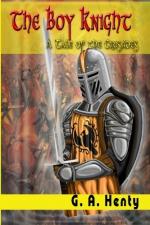One by one the gallant little band of knights fell, and a sea of turbans closed over the fluttering plumes. Cuthbert, after defending himself with extreme bravery for a long time, was at last separated from the small remainder of his comrades by a rush of the enemy’s horse, and when fighting desperately he received a heavy blow at the back of the head from the mace of a huge Nubian soldier, and fell senseless to the ground.
When he recovered his consciousness the first impression upon his mind was the stillness which had succeeded to the din of battle; the shouts and war-cries of the Crusaders, the wild yells of the Moslems were hushed, and in their place was a quiet chatter in many unknown tongues, and the sound of laughter and feasting. Raising his head and looking round, Cuthbert saw that he and some ten of his comrades were lying together in the midst of a Saracen camp, and that he was a prisoner to the infidels. The sun streamed down with tremendous force upon them; there was no shelter; and though all were wounded and parched with thirst, the Saracens of whom they besought water, pointing to their mouths and making signs of their extreme thirst, laughed in their faces, and signified by a gesture that it was scarcely worth the trouble to drink when they were likely so soon to be put to death.
It was late in the afternoon before any change was manifest. Then Cuthbert observed a stir in the camp; the men ran to their horses, leaped on their backs, and with wild cries of “Welcome!” started off at full speed. Evidently some personage was about to arrive, and the fate of the prisoners would be solved. A few words were from time to time exchanged between these, each urging the other to keep up his heart and defy the infidel. One or two had succumbed to their wounds during the afternoon, and only six were able to stand erect when summoned to do so by some of their guard, who made signs to them that a great personage was coming. Soon the shouts of the horsemen and other sounds announced that the great chief was near at hand, and the captives gathered from the swelling shouts of the Arabs that the new arrival was Sultan Suleiman—or Saladin, for he was called by both names—surrounded by a bodyguard of splendidly-dressed attendants. The emir, who was himself plainly attired, reined up his horse in front of the captives.




